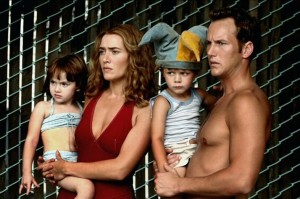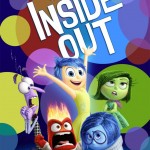 This review was originally published at Christianity Today in October 2006.
This review was originally published at Christianity Today in October 2006.
–
Ever watch moths fluttering around bright lights at night and ask yourself, “Don’t they know that they’ll burn themselves up?”
And yet, so many of us play out the same sad drama. Restless with longing, we respond to dangerous temptations and indulge misguided passions. And then we — and sometimes our families — pay for it.
This metaphor comes to vivid life in Todd Field’s riveting new film Little Children. Working from a screenplay that he and Tom Perrota adapted from Perrota’s novel, Field paints a deeply disturbing picture of a cozy New England neighborhood in which everyone is pursuing happiness in misguided ways.
In fact, the movie will be too disturbing for some, because it is unflinchingly truthful about sins such as lust, sexual infidelity, and pedophilia. And while Perrota’s story is profoundly moral, Field brings it to life in illustrations so explicit that some viewers may be led into temptation themselves.
This is Todd Field’s second film about the reckless pursuit of satisfaction. The first, In the Bedroom(2001), reminded us that our desire to judge and punish evildoers can easily lead us into evils of our own. Similarly, Little Children shows what can happen when we respond to disappointment and longing with childish recklessness.
But Little Children is more ambitious. Field skillfully weaves wry humor, absorbing drama, and nerve-wracking suspense in a style that reflects the influence of Stanley Kubrick. (Field had a small role in Kubrick’sEyes Wide Shut, another film in which lustful fantasies have a corrosive effect upon a marriage.)
It took some kind of mad genius to cast Will Lymon, the voice of PBS’s “Frontline” documentaries, as the film’s narrator. Lymon describes these relational catastrophes with a clinical matter-of-factness, the way a doctor might lecture about cancer. And while big screen narration usually ends up insulting viewer intelligence, in this movie it serves as a tongue-in-cheek way of saying that those of us who behave like terrible toddlers sometimes need even the simplest things explained to us.
The story he tells goes like this:
Trying to be a good mother, Sarah Pierce (Kate Winslet) frequently takes her daughter Lucy to their suburban neighborhood park. Sarah dropped out of graduate school to raise Lucy, and motherhood doesn’t come as naturally to her as it does to the three uber-moms she encounters at the park.
As catty and cruel as schoolgirls, those judgmental women make it painfully clear to Sarah that she doesn’t live up to their standards of conformity. They’re obsessed with perfecting their willful offspring. “All they want is sugar,” sighs one. “Constantly.”
But they have their own unhealthy desires. All three women betray marital dissatisfaction by gazing dreamily at “the prom king.” That’s what they call Brad Adamson (Patrick Wilson), the muscular, handsome young father who brings his son Aaron to the park.
But Brad has problems of his own. Working as a househusband while he studies to pass the bar exam, Brad struggles with embarrassment while his wife, a brunette bombshell named Kathy (Jennifer Connelly), is off making PBS documentaries. Intimidated by her professional success, and longing for the freedom of childhood, Brad spends hours watching young skateboarders, drawn to the glow of their freedom and energy. And when he’s invited to join a community football league, he pursues his dream of quarterback glory. “Trying new things made him feel alive,” says the narrator.
The real trouble begins with a casual error in judgment. Repulsed by the smugness of her self-righteous peers, Sarah playfully provokes them by befriending the object of their affection, ultimately leading to a reckless sexual affair. Like a nervous teen, Brad asks, “Do you feel bad about this?”
But Sarah and Brad aren’t the only “kids” breaking the “playground rules” here. Sarah’s husband Richard (Gregg Edelman) is on his own careless pursuit of pleasure, hiding in his office and staring at pictures of “Slutty Kay,” an online porn star. Elsewhere, Brad’s wife Kathy is devoted to diversions that, while far less scandalous, are similarly detrimental to her marriage.
So we watch them go, like moths to various flames.
And it gets worse. Just out of jail, a pedophile named Ronnie (Jackie Earle Haley) has moved into the neighborhood to live with his overly affectionate mother (Phyllis Somerville). The community is appropriately concerned, and so are we.
If Field was trying to lampoon traditional family life, the wayAmerican Beauty did, he might have made Ronnie more sympathetic, in order to paint the families who fear him as devils and hypocritical conservatives. But Field’s too smart for that. He shows us that Ronnie’s disease really is dangerous and perverse. Clearly, Ronnie’s mother is wrong in assuming that all he needs is a girlfriend his own age. And when he slips into a community swimming pool full of vulnerable children, his predatory nature is accentuated by his black scuba gear. It’s as scary as a scene from Jaws.
And yet, Field asks us, is anyone willing to offer him some grace, compassion, and help?
For some, healthy concern quickly swells into explosive paranoia and rage. Brad’s friend Larry (Noah Emmerich), a retired policeman and head of the Committee for Concerned Parents, is so upset about Ronnie’s sins that he declares a sort of “war on terror” against the pedophile. He attacks him at his home, vandalizes his property, and stands on the lawn delivering hysterical late-night tirades. Field doesn’t hesitate to draw a stark comparison between this and certain present-day global dramas—the destructive effects of fear mongering, and the way in which rash retaliation makes a bad situation worse. Are we any safer for having carried swift, drastic, poorly coordinated violence into someone else’s “yard” in the name of “homeland security”?
Ultimately, it becomes clear that the children in this town are endangered not only by the pedophile, but by the secret sins and fears of their childish parents.
Unfortunately, in his courage to expose the ugliness of sin with stark honesty, Field oversteps the bounds of propriety. He was smart to portray Brad and Sarah’s sexual escapes as urgent, desperate grabs for happiness. But in doing so, he asks them to expose too much. For many this will be shocking, disrupting the flow of the film. For others, it will offer fuel for the fires of their own destructive fantasies.
That’s a serious flaw in what is otherwise a profound work of art. Few films have been more truthful in showing us how our “secret sins”—those indiscretions we try to rationalize—are like weeds that take root, spread, and shatter our foundations. Little Children is sure to remind viewers of other discomforting studies of infidelity, including The Ice Storm, We Don’t Live Here Anymore, and The Squid and the Whale. And thankfully, it avoids the mistakes of American Beauty, which took its characters’ reckless indulgence too lightly, and let them off the hook by damning a convenient scapegoat: a villainous conservative family man.
But Field is after something far more ambitious and profound than any of those films. He wants us to remember that all have sinned, and that we thus should treat one another with compassion and grace. Sometimes, Christians are the people who need to hear this the most. In our zeal for righteousness, we can easily become cruel and condemning reactionaries, forgetting Christ’s demonstration of compassion and gentleness toward the depraved and the desperate.
This idea is captured beautifully in a scene during which Sarah explains her sympathy for the promiscuous title character of Madame Bovary. “It’s the hunger,” she says, “the hunger for an alternative and the refusal to accept a life of unhappiness.” Sarah acknowledges that Madame Bovary did not make the best choices, but she confesses her understanding that the sin stems from needs that are not being met, from an absence of love.
The film is exceptional not only in its truth, but in its craftsmanship. It’s a showcase of superb acting. Patrick Wilson makes a strong leading man. Jackie Earle Haley’s turn as the pedophile is incredibly complex, and he’s likely to earn an Oscar nomination. So is Kate Winslet, who develops Sarah into a character so three-dimensional and real that, by comparison, some of the other characters—Richard, Larry, and the judgmental mothers—seem simplistic and even cartoonish.
Little Children does not conclude with a “happily ever after” ending. Field isn’t interested in appeasing the audience’s expectation for gushing confessions and teary-eyed reconciliation. That would be dishonest and unrealistic. Instead, he tells the truth. Our sinful appetites cannot be entirely eliminated in this lifetime, and thus none of us can boast. No relationships, vocations, or neighborhoods can solve our hunger for the sugar that will rot our teeth. And yet, if we allow the scorching glow of temptation to steer us away from our responsibilities, while we may experience fleeting jolts of happiness, we’ll lose the opportunity for lasting fulfillment and joy.
Perhaps it’s no coincidence that the film’s tag line reads, “Let the little children come unto me.”
–











